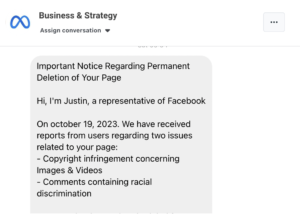Facebook Spam Messages: What to out look for
Facebook Spam Messages: What to out look for

If you have a Facebook business account, you may have noticed recently that there’s been an influx of messages coming through to you from accounts that appear to be from Facebook themselves…
These may look completely legitimate, with many of these profiles having a Facebook logo as their profile picture, a name such as “Business and Strategy” and messages tending to be captioned with something similar to “Important Notice Regarding Permanent Deletion of Your Page”.
Many of these messages are sent from people who claim to be a “representative of Facebook” and go on to list several dates and times when your profile has been allegedly reported for copyright or discrimination reasons, later asking you to click on a link to ‘review’ these reports. Below is an example of just how real these messages can appear:

It is very important to emphasise here that these messages are not legitimate, they are spam messages and a clever new way for scammers to target unsuspecting people, enticing them to enter personal information via unsafe website links. Do not click on these links, no matter how convincing these messages may appear.
Spam involves contacting people with unwanted content or requests and can spread by clicking these unsafe links that you may be finding in your message inbox, jeopardising your privacy and business information.
If you have been finding these messages have been making their way into your personal or business Facebook inboxes, always keep your guard up and practise the following:
1) Never accept an invitation from someone you do not know.
2) Be suspicious of messages that claim to be from Facebook, especially those that encourage you to leave the site by clicking on an external link.
3) Block the person who sent the message and report the message to Facebook within Messenger.
4) Regularly change and update your passwords, and do not use the same one across multiple sites.
5) Enable automatic updates on your laptop or desktop to help prevent phishing attempts through the software of your device.
If you are ever unsure of any messages that you may receive or have any doubt about their legitimacy, please do contact us for any help and reassurance. We can take a look at the message, as well as show you more about what to look for when it comes to spam messages.
For more information about managing spam on Facebook, you can take a look at the official Facebook advice here, or if you think you may have received and clicked on a suspicious message in the past, take a look at the guidance on what to do in this instance here.
If you’d like to learn more about how MiHi Digital can help your business grow, get in touch with Mark at the Team!
Call us on 01566 232323 or email hello@mihidigital.co.uk
Related Posts
New Website Launched for City People Recruitment
City People Recruitment are a Southwest-based employment agency that, despite being new to the field, has a proven …
Tourism Trends Q&A with MiHi Mark: Where do we stand and what does the future hold?
Tourism Trends: Where do we stand and what does the future hold? Join us for an exciting discussion …
Search
Categories
- Brands (31)
- Business (11)
- Clients (171)
- Content Marketing (58)
- Creative (4)
- Current Vacancies (3)
- Digital Strategy (65)
- Email Marketing (31)
- Events (54)
- Facebook (71)
- Featured News (13)
- Google Advertising (24)
- Google Analytics (23)
- Google Plus (33)
- Google Tools (21)
- Holidays (28)
- Infographics (12)
- Instagram (6)
- Instagram (1)
- Interesting things (49)
- Lifestyle (4)
- LinkedIn (26)
- Logos (8)
- MiHi news (139)
- Search Engine Optimisation (81)
- Social Media (139)
- Tourism (21)
- TripAdvisor (1)
- Twitter (70)
- Uncategorised (12)
- Uncategorized (1)
- Website Design (182)
- Whatsapp (1)


